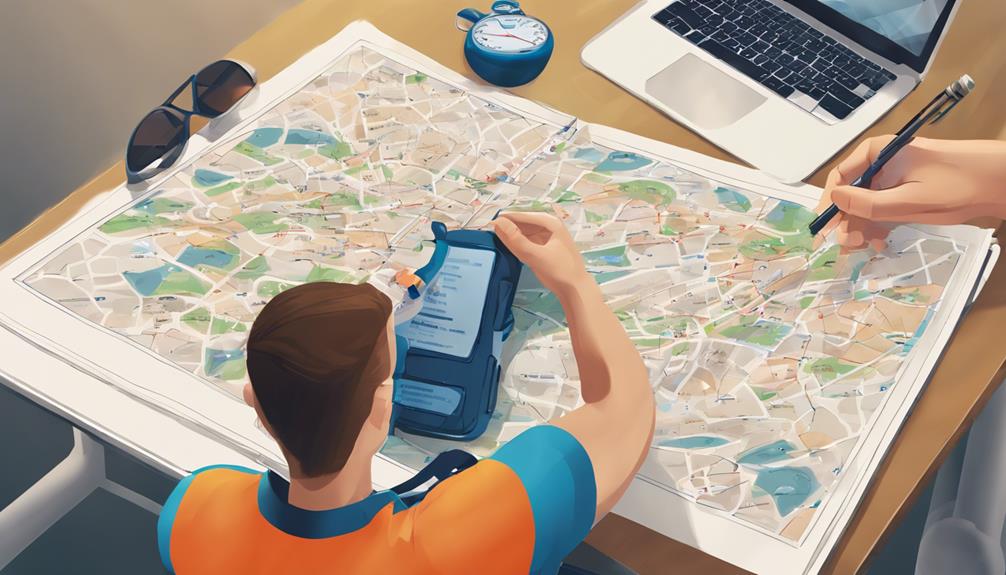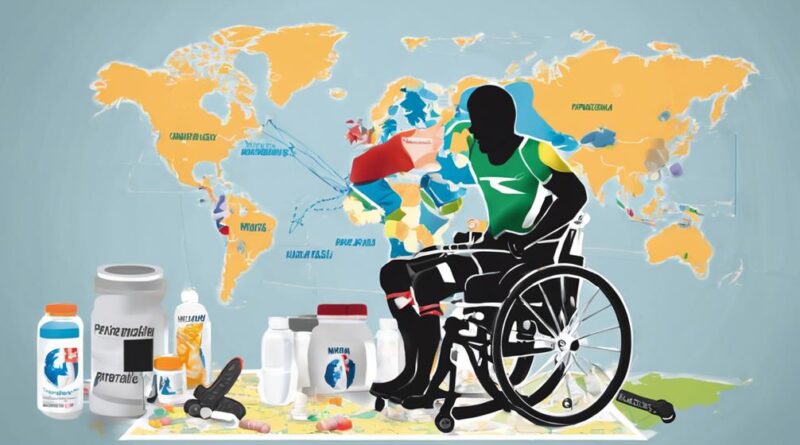Essential Tips for Upcoming International Para-Athletics Competitions
Get ready to tackle the challenge of upcoming international para-athletics competitions with a focus on fine-tuning your training preparation.
From mastering your mental game to ensuring your equipment is in top shape, these essential tips will give you a competitive edge.
But there's one often overlooked aspect that can truly make or break your performance on the big day – a crucial element that lies within your grasp but requires careful attention.
Training Preparation
To excel in international para-athletics competitions, ensure your training preparation is focused and tailored to your specific needs. Training intensity plays a crucial role in your performance. It's essential to strike a balance between pushing yourself to the limit and avoiding burnout. Design a training program that challenges you progressively, allowing for growth without risking injury. Remember, consistency is key. Make sure to follow your schedule diligently, giving your best effort in every session.
In addition to training intensity, incorporating pre-competition rituals can help you get into the right mindset for the upcoming event. These rituals can be anything that makes you feel prepared and focused, whether it's a specific warm-up routine, listening to a particular playlist, or visualizing your success. By establishing these rituals, you create a sense of familiarity and control, reducing pre-competition jitters and boosting your confidence.
As you prepare for international para-athletics competitions, remember that your training should be personalized to address your strengths and weaknesses. Seek guidance from coaches and experts to fine-tune your program and ensure you're making the most out of your preparation. By focusing on training intensity and incorporating pre-competition rituals, you set yourself up for success on the international stage.
Equipment Checklist
Ensure your equipment checklist is comprehensive and tailored to meet the specific requirements of your discipline and personal preferences. Start by including adaptive gear that's essential for your para-athletics discipline. This may include specialized wheelchairs, prosthetics, hearing aids, or any other equipment that enhances your performance. Make sure all adaptive gear is in good condition and functioning optimally to avoid any issues during competitions.
Equipment maintenance is crucial to ensure peak performance. Regularly check all your equipment for wear and tear, and address any issues promptly. This includes tightening bolts, replacing worn-out parts, and keeping everything clean and well-lubricated. Proper maintenance not only prolongs the lifespan of your equipment but also minimizes the risk of malfunctions during competitions.
Create a checklist that covers all the equipment you'll need, including backup options for critical items. Double-check that you have packed everything before you travel to the competition. Familiarize yourself with the rules and regulations regarding equipment for your specific event to avoid any last-minute surprises.
Nutrition Plan
Maintain peak performance at international para-athletics competitions by strategically planning your nutrition intake. Proper hydration is key to your success. Develop a hydration strategy that ensures you're drinking enough water throughout the day and during training sessions. Dehydration can significantly impact your performance, so it's crucial to stay well-hydrated.
When it comes to pre-race fueling, focus on consuming a balanced meal that includes carbohydrates for energy, lean proteins for muscle repair, and healthy fats for sustained energy. Experiment during training sessions to determine what foods work best for you and avoid trying anything new on race day.
After your races, prioritize recovery by consuming snacks that contain both carbohydrates and protein. This will help replenish glycogen stores and repair muscle tissue. Additionally, consider incorporating race day nutrition practices into your training routine to fine-tune what works best for you.
Rest and Recovery
Rest and recovery are essential components of your training regimen to optimize performance and prevent burnout. To excel in upcoming international para-athletics competitions, prioritize your sleep schedule and hydration routine. Adequate rest is crucial for muscle repair and overall well-being. Aim for 7-9 hours of quality sleep each night to allow your body to recover fully. Additionally, establish a consistent sleep routine to optimize your body's natural recovery processes.
Hydration is equally vital for your performance. Develop a personalized hydration routine based on your training intensity and individual needs. Proper hydration supports muscle function, joint lubrication, and temperature regulation, all of which are integral to your athletic success. Remember to hydrate before, during, and after training sessions to maintain peak performance levels.
Incorporate active recovery techniques into your routine to enhance muscle recovery and reduce the risk of injuries. Engage in light exercises, such as swimming or cycling, to promote blood flow and alleviate muscle soreness. Moreover, incorporate relaxation techniques like meditation or yoga to reduce stress and improve mental clarity. These practices won't only aid in physical recovery but also boost your mental resilience for the challenges ahead.
Travel Logistics
To streamline your preparations for international para-athletics competitions, mastering efficient travel logistics is paramount for ensuring you arrive at your destination ready to perform at your best. When it comes to packing essentials, make sure to pack your competition gear, including uniforms, shoes, and any specialized equipment you may need. It's also crucial to pack necessary personal items like medication, toiletries, and extra clothing in your carry-on bag in case of luggage delays. Organizing your belongings in a systematic way can save you time and stress during your journey.
Understanding airport procedures is key to a smooth travel experience. Familiarize yourself with security protocols for carrying sports equipment and any medical supplies you require. Arrive at the airport early to allow time for check-in, security checks, and potential unexpected delays. Be prepared to communicate your needs clearly to airport staff to ensure a hassle-free process.
Consider investing in a sturdy and reliable travel bag that can withstand the rigors of frequent travel. Make sure your bag is labeled with your contact information in case it gets misplaced. By mastering packing essentials and understanding airport procedures, you can set the stage for a successful and stress-free journey to your international para-athletics competition.
Mental Preparation
Prepare your mind just as diligently as you prepare your body for international para-athletics competitions. Mental preparation is key to performing at your best when it matters most. Incorporating visualization techniques into your routine can help enhance your performance on competition day. Before your event, take some time to visualize yourself executing each part of your race or routine flawlessly. Imagine the sights, sounds, and feelings associated with success. This mental rehearsal can help build confidence and reduce anxiety, putting you in the right mindset to excel.
In addition to visualization, practicing positive affirmations can also boost your mental preparedness. Repeat phrases like 'I am strong,' 'I am focused,' or 'I am ready' to yourself regularly. Positive affirmations can help drown out negative thoughts and replace them with empowering beliefs. Building a strong mental foundation through visualization and positive affirmations can give you the mental edge needed to push through challenges and perform at your peak during competition.
Competition Strategy

When approaching competition strategy, focus on analyzing your opponents' strengths and weaknesses to tailor your game plan effectively. This step is crucial in helping you make informed decisions during the competition. Here are three essential tips to enhance your competitive edge:
- Performance Mindset: Cultivate a performance mindset that focuses on your strengths rather than solely on your opponents' abilities. By believing in your training and capabilities, you can boost your confidence and mental resilience during the competition. Visualize yourself executing your techniques flawlessly and achieving your goals.
- Tactical Approach: Develop a tactical approach based on the strengths and weaknesses of your opponents. Identify areas where you can outperform them and create a game plan that maximizes your advantages. Adapting your strategy as the competition unfolds is key to staying ahead of the competition.
- Utilize Strategic Rest: Prioritize rest and recovery in your competition strategy. Ensuring you're well-rested and mentally prepared can significantly impact your performance. Incorporate rest periods into your schedule leading up to the competition to optimize your energy levels and focus during critical moments.
Post-Event Care
After completing your para-athletics competition, prioritizing recovery and self-care is essential for optimizing your physical and mental well-being. Injury prevention should be a top priority post-event. Ensure to ice any sore or swollen areas, and consider gentle stretching to maintain flexibility. If you have any specific concerns, consult with a sports physiotherapist to discuss rehabilitation techniques tailored to your needs.
For effective recovery methods, make sure to hydrate well and replenish your body with nutritious foods to aid in muscle repair. Additionally, getting sufficient rest is crucial for your body to recuperate fully. Engaging in light activities like walking or swimming can also promote blood flow and help with muscle soreness.
Don't underestimate the importance of post-event support. Surround yourself with friends, family, or a sports psychologist who can offer encouragement and help you process your performance. If you've experienced any setbacks during the competition, seeking professional help is a proactive step towards mental well-being.
Frequently Asked Questions
Are There Any Specific Rules or Regulations Regarding the Use of Assistive Devices or Equipment During Para-Athletics Competitions?
When competing in para-athletics, it's important to be aware of the rules and regulations surrounding the use of assistive technology and equipment. These guidelines ensure fair play and safety for all athletes.
Make sure to familiarize yourself with the specific regulations regarding the use of assistive devices to comply with the competition rules.
Stay informed and prepared to compete at your best while following the equipment regulations set forth for para-athletics competitions.
How Do Athletes With Disabilities Navigate the Competition Venue and Access Facilities Such as Restrooms and Changing Rooms?
When at a competition venue, athletes with disabilities may face accessibility challenges. It's essential that venues provide inclusive practices to ensure smooth navigation and access to facilities like restrooms and changing rooms.
Are There Any Resources Available for Athletes to Connect With Other Para-Athletes and Build a Supportive Community During International Competitions?
When competing internationally, resources are available for you to connect with other para-athletes and build a supportive community. Through community building and networking, you can find peer support and make valuable connections.
These interactions can provide motivation, encouragement, and a sense of belonging during competitions. Engaging with fellow athletes can enhance your overall experience and create lasting bonds within the para-athletics community.
What Measures Are in Place to Ensure the Safety and Well-Being of Para-Athletes Competing in Unfamiliar Environments?
When competing in unfamiliar environments at international para-athletics events, ensure your safety and well-being. Mental preparation is key to handle cultural differences.
Language barriers may exist, so familiarize yourself with common phrases. Organizers usually provide medical support, but carry essential medications.
Stay vigilant, follow safety protocols, and reach out for help if needed. Your well-being is a priority, so take necessary precautions while embracing the excitement of competing internationally.
How Do Para-Athletes Handle Unexpected Challenges or Obstacles During Competitions, Such as Adverse Weather Conditions or Technical Issues With Equipment?
When unexpected challenges arise during competitions, para-athletes rely on their mental toughness to handle pressure. Adverse weather conditions or technical equipment issues can test your resilience, requiring quick thinking and adaptability.
By staying focused and maintaining a positive mindset, you can navigate these obstacles effectively. Remember, your ability to handle these challenges demonstrates your strength and determination as a para-athlete.
Stay resilient and tackle each hurdle with confidence.
Conclusion
Remember, success in international para-athletics competitions isn't just about physical preparation, but also mental, logistical, and post-event care.
By following these essential tips for training, equipment, nutrition, rest, travel, mental preparation, competition strategy, and post-event care, you can maximize your performance and achieve your goals.
Stay focused, stay positive, and most importantly, enjoy the experience of competing on the international stage. Good luck!
